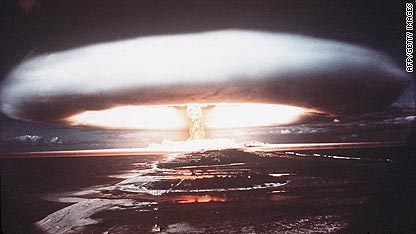
As she set the stage for this week's nuclear security summit, U.S. Secretary of State Hillary Clinton made a clear and considered statement on India and Pakistan's nuclear arsenals, saying they had "upset the balance of nuclear deterrent."
But at Beacon House Middle School in Rawalpini, Pakistan, that new nuclear balance is a point of pride: Pakistan is one of only nine countries in the nuclear club. It can defend itself.
So, we wondered how Beacon House students would react to an old but influential film that President Reagan said helped persuade him to pursue nuclear peace. We invited them to watch "The Day After," a 27-year-old film about a nuclear attack that changed the way a generation of Americans perceived the threat. Reagan said the movie depressed him, and now President Obama has carried on with Reagan's legacy, making nuclear peace the centerpiece of his security summit in Washington.Before they screened the movie, we asked these adolescents, the majority of whom are the daughters and sons of military officers, about their views on nuclear weapons.
Curious and attentive, 13-year-old Fatima Ahmed was the first to utter categorically that having nuclear weapons was "important for every country" and that she was gratified Pakistan had already developed them.
"If some country declares war on us, they will not declare war because they know that we have nuclear weapons," added her 11-year-old classmate, Zakaria Amjad.As the movie rolled, the students were riveted, especially as the nuclear missiles were launched from American bunkers in a thunderous chorus. They took in every minute, just like ten of millions of students had in classrooms throughout North America in the 1980s. As doomsday loomed in the U.S., the Beacon House students recoiled, their reaction seemingly no different than the generation before them.Some said the movie had changed their minds about nuclear weapons.
"Before, I used to think that it did have many advantages, but now after watching all the destruction in this movie, I think that nuclear aren't that good," said Lyba Khan, 13.
"I thought that it could be used for defense, but after I saw the movie, I think it wreaks havoc with the country," said Sultana Bassi, 13.wow leveling
So far, so predictable. But following those comments, there were insightful calculations made and expressed by some of the other students."Nobody wins, it's a lose-lose situation," said Saadullah Zia, 13. But when asked whether Pakistan should keep its nuclear weapons, he added: "Some of the countries right now have it, so if we give it up, nothing will happen. Instead, India will be more powerful than us."
These students have grasped all too well the dilemma of the nuclear arms race. The Cold War might as well be the Ice Age to these Pakistani students. The political and strategic calculations have changed dramatically, just as Clinton had noted.
These students are barely teenagers, but they are the future leaders of Pakistan, and they offered some remarkable reflections on the movie.power leveling
"It's waking us up. It's telling us that we can all die, in a glimpse of an eye if one atomic bomb is used in our country," said Fatima Taj, 13, before adding that she still would not like to see Pakistan give up its nuclear weapons.